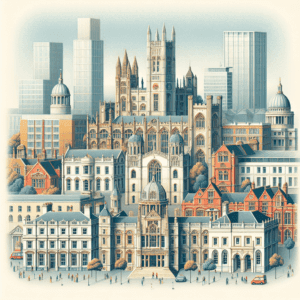South London is an area that boasts a rich tapestry of higher education institutions. From renowned universities to specialized colleges, the region serves as a hub for diverse academic pursuits. This guide aims to provide an overview of the key higher education institutions in South London, highlighting their unique characteristics, offerings, and contributions to the community.
1. King’s College London
Located primarily in the heart of London, King’s College London extends its footprint into South London with various campuses, including the Guy’s and Denmark Hill sites. Established in 1829, it is one of the oldest and most prestigious universities in the UK. King’s is particularly known for its strong health sciences programs, law, and humanities. The university offers a robust research environment, with several research centers contributing to advancements in medicine and social sciences.
Key Features:
- Comprehensive range of undergraduate and postgraduate programs
- Strong emphasis on research and innovation
- Central location with easy access to a wealth of cultural and historical resources
2. South Bank University
London South Bank University (LSBU) has firmly established itself as a key player in South London’s educational landscape. Situated near the River Thames, LSBU is known for its practical approach to learning, with a strong focus on employability and vocational courses. The university offers a range of undergraduate and postgraduate programs across business, engineering, health, and arts disciplines.
Key Features:
- Strong links to industry partners, ensuring upon graduation students are workforce-ready
- Emphasis on real-world experience through placements and consultancy projects
- Vibrant campus life with diverse student organizations
3. Goldsmiths, University of London
Goldsmiths, part of the University of London, is located in New Cross and is renowned for its creative arts and social sciences programs. Established in 1891, Goldsmiths prides itself on its innovation and the interdisciplinary nature of its courses, fostering a culture of creativity and critical thinking. The institution attracts a diverse student body, emphasizing inclusivity and a global perspective.
Key Features:
- Strong focus on arts, humanities, and social sciences
- Unique programs promoting interdisciplinary studies
- Active participation in cultural events and exhibitions
4. University of Greenwich
The University of Greenwich, with its stunning campus overlooking the River Thames in Woolwich, is known for a broad range of programs, including business, education, and engineering. It offers a supportive environment and has a strong commitment to student success, with numerous resources available to facilitate learning and personal development.
Key Features:
- Historic campus with modern facilities
- Commitment to sustainable development and community engagement
- Internationally recognized programs with a diverse student base
5. St. George’s, University of London
St. George’s specializes in health-related courses and is renowned as the UK’s only independent medical and healthcare higher education institution. Located in Tooting, it focuses on medicine, biomedical sciences, and health-related subjects. As a teaching hospital, St. George’s provides students with hands-on experience in clinical settings, preparing them for careers in healthcare.
Key Features:
- Emphasis on medical education and training
- Strong partnerships with NHS hospitals for practical learning
- Focus on research in global health challenges
6. University of the Arts London (Chelsea College of Arts)
Chelsea College of Arts, part of the University of the Arts London, is situated in South London and specializes in art and design education. Offering various undergraduate and postgraduate courses, it emphasizes studio-based learning, helping students develop their unique artistic voices.
Key Features:
- Strong emphasis on practical and studio-based learning
- Close ties with the creative industry for networking and internship opportunities
- Hosts various exhibitions showcasing student work
Conclusion
South London’s higher education institutions provide a diverse and enriching environment for students pursuing various academic interests. Each institution brings unique strengths to the table, catering to a wide array of disciplines and supporting the educational aspirations of a diverse student population. Whether one is drawn to the arts, sciences, health, or business, South London offers a wealth of opportunities for higher education, contributing to the personal and professional growth of students within the community.







